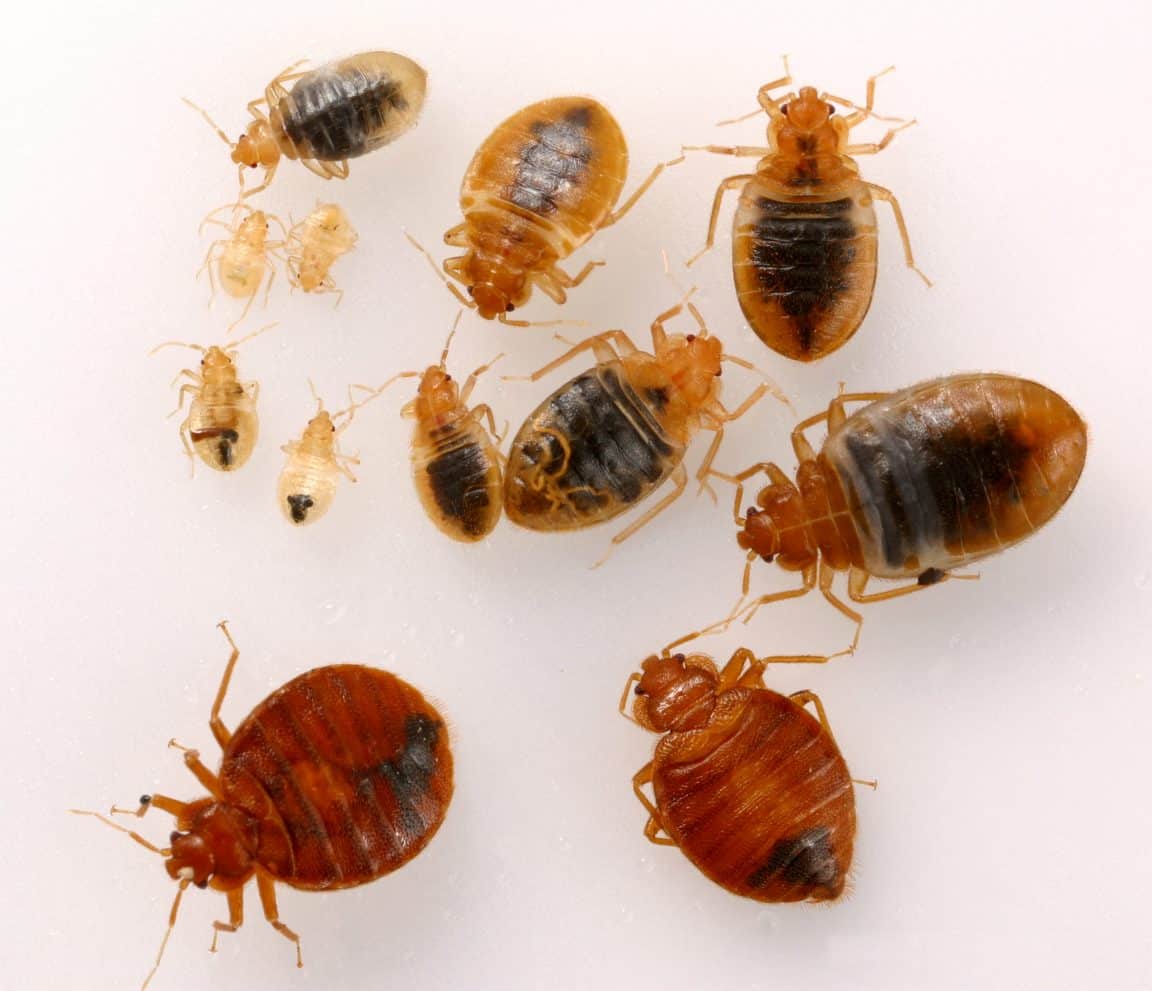Does Raid spray kill bed bugs? There are many people who’ll swear on their mother’s grave that it kills them better than anything they’ve ever seen. There is an equal number of people who’ll swear just as fervently that it doesn’t do diddly squat. So who is right?
Actually, both groups are partially right.
We’re not playing word games here or trying to have it both ways, but the answer to this question is more complicated than it looks at first glance. In order to explain, we’ll have to define some terms, examine the life cycle of bed bugs, why older pesticides don’t work on bed bugs anymore, look at the active ingredients in Raid as compared to some other leading bed bug sprays such as Bedlam Plus, then finally answer the question in a way that makes sense. Finally, we’ll wrap it up with some clear cut directions on how to properly use bed bug sprays.
There’s a lot of information to cover, so let’s get started!
4.6
Over 90 years of experience
Nationwide service area
Free retreatments if pests return
4.7
Treats 20 types of pests
Offers instant online quotes
30-day money-back guarantee
What Does “Kill” Mean?
When Advertising Executives say that a pesticide kills a certain kind of bug, you have to dig into the fine print to figure out exactly what they mean. Television commercials strongly imply that their product kills bugs dead the moment it touches them, which simply isn’t true. Any chemical strong enough to kill bugs instantly would be strong enough to be dangerous to people, too.
Often they will use the phrase “kills bugs on contact” which again implies instant death for bugs. As experienced and licensed pest control professionals, we can tell you exactly what that phrase means in the real world. It means bugs have to come into physical contact with the pesticide in order for it to begin killing them. Unless you spray every square inch of your house, there are bound to be areas that weren’t treated and bugs in that area will be loving life.
Another thing manufacturers never tell you is that their product can’t do anything about the insect eggs. That’s because the only way to kill an insect egg is to physically crush it, burn it with fire, or melt it with acid. Insecticides can’t penetrate the shell of the bed bug eggs – at all.
Many people don’t understand that so you’ll see customer reviews complaining that the bugs keep coming back. Well, yes. More of them are hatching out all the time, then laying more eggs. You spray and kill some bugs. The eggs hatch out. The new bugs grow up and lay eggs. You spray and kill some bugs. Rinse and repeat, over and over again. It’s a never-ending cycle.
Finally, manufacturers play games with the residual effects of their spray. How long does it last? Maybe they claim it will last for X number of weeks. Perhaps that’s true, but won’t they don’t tell you is that it has grown so weak and diluted that it isn’t strong enough to kill bugs anymore. It’s still there but it isn’t doing anything. What good is that?
What is the Bed Bug Life Cycle?
The life cycle of bed bugs is pretty straightforward; after mating the females begin laying eggs. They lay them in protected areas such as cracks and crevices. The eggs are tiny white ovals about 1/16 of an inch in length. Each female lay between 200-250 during her life, about five per day.
Six to 10 days later the eggs hatch. The newly born bed bugs are called nymphs. They are white or pale gray until they eat their first meal of blood. After that, they’ll assume their customary reddish-brown color. About a month after hatching they will be grown and ready to mate. Then the cycle starts all over again.
Old Pesticides
Older pesticides break down into two main categories; ones that were banned and ones that are still available but no longer very effective against bed bugs.
Due to environmental concerns, many pesticides were banned by the EPA. Unfortunately, the pesticides they choose to ban were the most effective at killing bed bugs and other pests. Some of the pesticides that banned included:
While it’s true that these pesticides, especially chlordane have long-term residual effects on insects, they don’t actually hurt the environment very much. Many activists simply didn’t like the idea of persistent chemicals and they were able to persuade the EPA to ban them.
Any time you spray a pesticide, any pesticide, there is always a tiny percentage of insects that, for whatever reason, have a natural resistance to that pesticide. They’re simply born that way. When you spray and some of them are present, they’ll be the ones who survive and reproduce, passing on their resistance to their offspring. In biology, it’s known as the founder effect.
Due to the relatively quick life cycle of most insects, this pesticide resistance spreads very quickly in their population. As a result, pesticides that once were highly effective at killing bed bugs (and others) eventually become ineffective and manufacturers have to conduct expensive research to develop new active ingredients that will kill the resistant population.
By expensive, we mean in the range of $100 million or more, including clinical trials and EPA licensing. It’s also a lengthy process that can take five to ten years from beginning to end.
Active Ingredients
Pesticides are different than active ingredients. Pesticides are things like Taurus SC, Suspend SC, Bedlam Plus, and Raid Max Bed Bug. The active ingredients are the chemicals in the pesticide that actually do the killing of the insects. Many pesticides contain the same active ingredients. This is true for the last two pesticides in our list.
Bedlam Plus contains the following active ingredients (from the label):
- 3-phenoxybenzyl-(1RS, 3RS, 1RS, 3SR)-2, 2-dimethyl-3-(2-methylprop-1-enyl) cyclopropanecarboxylate (0.40%)
- N-Octyl bicycloheptene dicarboximide (1.00%) *** MGK 264 Insecticide Synergist
- Imidacloprid (0.05%)
The other 98.55% of the contents are inert ingredients, carrying agents, and additives.
Raid contains the following active ingredients (from the label):
- 3-phenoxybenzyl-(1RS, 3RS, 1RS, 3SR)-2, 2-dimethyl-3-(2-methylprop-1-enyl) cyclopropanecarboxylate (0.40%)
- N-Octyl bicycloheptene dicarboximide (1.00%) *** MGK 264 Insecticide Synergist
- Imidacloprid (0.05%)
Again, the other 98.55% is inert ingredients, carrying agents, and additives.
Since the active ingredients are the same, you’d think the two products would be identical in their effectiveness and residual effects. The truth is the exact opposite.
The reason is contained in the other 98.55% of supposedly inert ingredients. Those ingredients are “inert” only insofar as actual bug-killing is concerned. Their real effects are the way they preserve the active ingredients, protect them from environmental degradation, help them stick to the surface they were sprayed on, shield them from UV damage, and help activate them. That 98.55% is the manufacturer’s most closely guarded secret and it makes all the difference in the world.
From personal experience in the field, we can tell you that Raid, for all its slick advertising and eye-catching labels doesn’t do half as good a job as Bedlam Plus. It works to a point, but that’s all.
How to Use Bed Bug Sprays
Whether you’re using Raid or Bedlam Plus, you’ll need to follow the following procedure to use it to kill bed bugs. The main difference is that you’ll have to repeat the entire procedure one every two weeks with Bedlam Plus and once a week with Raid.
You need to target areas where bed bugs hide: Spray all the baseboards and floorboards in the house. Spray the entire bed frame of every bed. Spray the seams of all the mattresses and pillows, and don’t forget to spray the box springs, box spring seams, and headboards. Spray inside and outside every drawer in the bedrooms. Spray all the door hinges. Spray the blinds in the windows and all the cracks and crevices in the windows. Spray around all the electrical sockets. If you have rugs or carpet in the room, spray every inch of them. Spot treatment will not be enough here: the treated area must be extensive.
Under normal conditions, one can of pesticide should be used to treat one room in the house. If you use less, you’re going too fast or not being thorough enough to tackle your bed bug problem.
Because insecticides can’t penetrate the eggs, you’ll need to respray every two weeks with Bedlam Plus, or every week with Raid, for at least eight weeks. That will ensure all the eggs have hatched and you’ sprayed all the nymphs before they can mature and begin laying more eggs. Don’t be fooled just because you haven’t seen any bed bugs. They can survive for weeks at a time between meals. Make sure you complete the entire eight-week course of treatment.
Think you might need professional help with your bed bugs problem? Use the form below to connect with local pest control pros:












